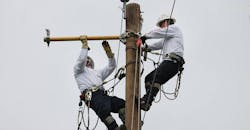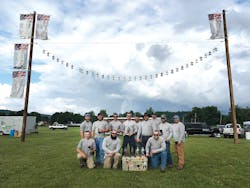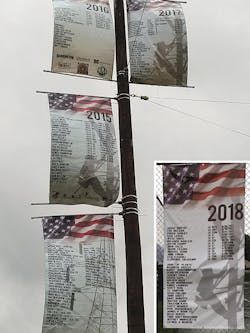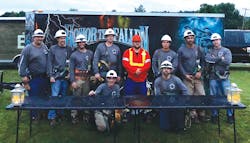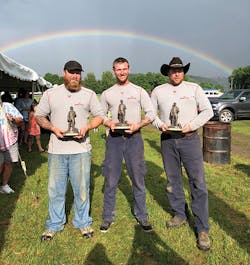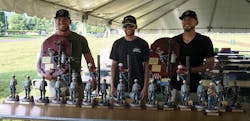Linemen Climb to Honor Fallen Workers
Twelve electric lanterns burned brightly in memory of lost brothers and sisters in the line trade at a 2018 Lineman’s Rodeo. As each lineman climbed a wood pole to hang a lantern, the families down below embraced one another and provided hope, healing and support for those left behind.
Now in its seventh year, the Climbing for Lost Linemen and Rodeo raises money for the families of fallen or injured IBEW journeyman, utility and apprentice linemen; groundmen; operators, LCTT and/or their spouses and minor children. In just 24 hours, the National Sisterhood United for Journeyman Linemen (NSUJL) raised a record of $83,000 from the entrance fees and sponsor support.
Linemen from all over the country traveled to the county fairgrounds in Clearfield, Pennsylvania, for the event. For the last six years, NSUJL has organized the ceremony for lost linemen, but it originally started back in 2011 in Missouri. In 2013, Tisha Meesley, the sole organizer, passed the torch on to NSUJL to manage the growth of the ceremony.
As such, the event continued to expand each year as awareness spread throughout the lineman community. Rachel Johnson, president and founder of NSUJL, says the family members of the fallen linemen come to the event for closure.
“The overall feeling of support, togetherness and solidarity is breathtaking,” she says. “While there are groups on Facebook and everyone knows each other, it’s completely different for the widows and family members to be able to hold and embrace one another. It makes you so proud to be part of the line community and what they are doing for each other no matter what.”
Preserving Memories
The night before the rodeo, the NSUJL invites the competitors to the fairgrounds, where they honor those who have fallen or have been injured. The names of the linemen are printed on banners, and the linemen sign up to climb a pole in recognition of these individuals.
“Even if they don’t know their brothers, they line up at a booth to climb for them,” Johnson says. “They are ready and willing to climb for a brother. It makes all of the hair on your arms stand straight, gives you chills and shows you the type of community we are part of.”
After the announcer says the name of the lineman and who he or she is climbing for, the lineman starts climbing up the pole. Johnson’s husband then lifts the lantern up to the lineman on a hand line, and the lineman flips the switch on the electric lantern and attaches it to the line with a tie wrap. The spectators then take a moment of silence or say a quiet prayer in memory of the fallen brother or sister.
Before the ceremony, linemen can sign up to serve as a climber for a particular lineman who has been injured or passed away. For example, this year, a lineman came all the way from Canada to Pennsylvania for the ceremony in support of the crew that was killed when a tower collapsed. As “Tears in Heaven” played over the loudspeakers, he climbed the pole in honor of his crew members. “He was broken up and in tears, and the brothers didn’t know him, but they gave him a hug,” Johnson says. “It was very touching, and I am honored to say we host the event.”
Competing in a Rodeo
The next morning, the special lights illuminate the county fairgrounds, where poles are set up year-round for the competition. For 2018, 19 journeymen linemen teams paid $150 each and 54 apprentices donated $50 each to compete in the 2018 Climbing for Lost Lineman Rodeo.
The competitors participated in a speed climb and hurtman rescue as well as two mystery events. For example, the journeymen performed an insulator changeout and a termination while the apprentices had to rescue a simulated cat from a transformer and bring it down safely. Also, the apprentices competed for the fastest time in the obstacle course in which they had to climb a pole and change out a cutout.
Dustin Curry, a lineman for Pacific Gas & Electric, and his team members, Jordan Chené and Brandon Branch (who filled in for Anthony Humbert, groundman) won the awards for best overall journeyman team, first place in speed climb, hurtman rescue, and insulator change-out and second place in cable termination. Curry, who was awarded best overall journeyman by NSUJL, also had the fastest time of the day in the speed climb and hurtman rescue. Meanwhile, Branch took home the award for best overall apprentice as well as the apprentice speed climb and hurtman rescue and third place in the apprentice obstacle course.
Curry said he has met a lot of interesting people at the rodeos, has enjoyed competing with his journeyman team and had a blast at the NSUJL rodeo in Pennsylvania. “They had really amazing trophies, cool and relaxed judges, awesome events, nice people and a great tribute to the fallen linemen,” Curry says. “I know we want to go back next year, and I would encourage everyone to try to make this rodeo.”
Along with Curry and his team, other competitors also traveled to Pennsylvania from most of the states in the Northeast, California, Missouri, Texas, Florida and Canada to the competition. Each entrant received a long-sleeved T-shirt and a fee mini bucket from Linemen’s Supply. On Friday, NSUJL had 200 to 300 people at its Climbing for Lost Linemen event, and then the next day, at the rodeo, cars packed the parking lot. “Each year, it grows, and more people get involved,” Johnson says. “I was in awe and shock about how many people kept coming as the day went on.”
The weather forecast called for torrential downpours on the day of the rodeo, but fortunately, Mother Nature only dropped a little rain, and the event drew a record crowd. “We had a short shower, but when the sun came out, the rainbows went over the lanterns,” Johnson says. “No matter what happens, it always seems to work out for us. Due to the importance of the event, it was like karma. Everything worked out just fine.”
Helping Families in Need
With the proceeds from the rodeo, the NSUJL is able to help families of linemen who have been injured or killed on the job. Since 2012, the nonprofit organization has reached out to those in need. “In 2011, there seemed to be a lot of accidents that were hitting all at one time,” Johnson says. “It caused a discussion in one of the wives’ groups on Facebook about how we could organize and fundraise to help families left behind.”
When they did some research, they couldn’t find an organization specifically for linemen. While other charitable organizations took donations for community-based professions like firemen, policemen and the military, no organization existed at that point in time specifically for linemen. “We were either going to let a good idea die or go ahead and start our own nonprofit,” Johnson says. “The right group of people came together, and we were able to form an organization to provide financial, emotional and physical assistance to the families of linemen.”
When a lineman is injured or killed, the bills can quickly start to pile up. “Families must put food on the table for their children and afford the roof over their head,” Johnson says. “A lot of times, they don’t have the sufficient income to cover the basic necessities.”
If a lineman is injured, then workman’s compensation may only pay 30% of their income, which is simply not sufficient, she says. She knows the pain that the families feel first-hand, as she was injured as a line apprentice while working for a contractor. At the time of her accident in 2004, her husband worked as a traffic technician, and they had an eight-year-old daughter. Overnight, they went from a double to a single income. “My accident changed my career path and my housing situation, and it threw our lives upside down,” she says. “I have been there and understand just how hard it is to be in that situation.”
At the age of 18, Johnson started her career in the line trade as a flagger after responding to an ad in the local newspaper. She then worked her way up to a chipper to a tree trimmer before searching for more lucrative positions at the local union hall. She learned that by earning her commercial driver’s license (CDL), she could work on the construction side. “They didn’t have to ask me twice,” she says. “I got my CDL, and I got a job as a groundhand doing underground and traffic signal work. I finally worked up to being an apprentice, and I continued down that lane until I got hurt.”
As an apprentice for a contractor in Philadelphia, she met her husband, who is now a journeyman lineman. After getting hurt, she worked for the state driving a truck until she learned her true purpose in life: to help the families of linemen. “I went through a bad situation in life and didn’t know why everything was taken away from me; I had to go through it,” she says. “It went full circle, and now I know why I was meant to go through it. It was to give back to the brotherhood that has given so much to me.”
Years later, she said it’s important for other injured apprentices and journeymen to keep the faith while they are going through a tough time. Her injury has played a key role in her compassion for others as they wrangle with worker’s compensation, and as a former apprentice, she understands how dangerous and risky the line trade can be. “Everyone knows someone who has passed away,” she says. “A lot of times, the accidents circulate on Facebook, and other times, linemen call us directly. We then reach out to the IBEW hall, make contact and wait for the families to contact us.”
Sometimes, the injured linemen or the families of deceased linemen request assistance immediately, while other times, they wait a month or two. Johnson says there are different ways of dealing with the situation, and her organization is there for the families when they need support.
For example, the members of NSUJL provide babysitting for a lineman’s children while the wife is making funeral arrangements, bring over homecooked meals and set up counseling services for the families. “Sometimes we get a call at 3 a.m. when a wife just wants someone to talk to,” Johnson says. “We do a lot, and there is no precise limitation to the amount of emotional and physical support we can do.”
Case in point: NSUJL provides recliners to linemen after they have suffered a burn on their arms. “You can’t use your arms right after a burn, and it’s difficult for the linemen to try to get up out of a normal chair,” she says. “With a recliner, however, it can tip forward so the guys can do it by themselves.”
While the organization is well known across a lot of the companies, the NSUJL is still trying to reach the 770,000 line workers in the country, she says. In addition, she says the organization wants to raise awareness about the work of linemen. “Even though the guys go out there every day and risk their lives, they get very little awareness from the general public. Everyone needs electricity, but they don’t care how it gets to them. Our organization is here to bring awareness for them to be safe and change the mindset of everyone.”
Sidebar
Supporting the Cause
Each year, the Climbing for Lost Linemen event has earned more and more proceeds to help the families of fallen linemen. Here are some of the sponsors and participating companies that helped make the 2018 ceremony and rodeo a success.
Sponsors:
IBEW Local 126 Buckingham Manufacturing
IBEW Local 42 IBEW Local 71
IBEW Local 876 Linemen’s Supply
Bashlin Industries IBEW Local 1319
Hogg & Davis Inc. IBEW Local 104
IBEW Local 66 M.J. Electric
Hi-Line Utility Supply IBEW Local 97
IBEW Local 125 Tyndale Co.
KV Line Safety IBEW Local 459
IBEW Local 196 Utilities Employees Credit Union
Hubbell Power Systems IBEW Local 351
Speed Systems IBEW Local 111
IBEW Local 222 Milwaukee Tool North America
Henkels & McCoy IBEW Local 196
IBEW Local 369 IBEW Local 29
Farwest Line Specialties IBEW Local 611
IBEW Local 1249 Scott Pendergast
Teams and Apprentices:
IBEW Local 3 IBEW Local 456
IBEW Local 42 IBEW Local 1245
IBEW Local 53 IBEW Local 1392 (Mishawaka Utilities)
IBEW Local 71 IBEW Local 1600 (PPL Electric)
IBEW Local 97 (National Grid) Eversource Energy
IBEW Local 126 SMECO
IBEW Local 351
Editor’s note: To see videos from the event, visit the NSUJL’s Facebook page.
About the Author
Amy Fischbach
Electric Utilities Operations
Amy Fischbach is the Field Editor for T&D World magazine and manages the Electric Utility Operations section. She is the host of the Line Life Podcast, which celebrates the grit, courage and inspirational teamwork of the line trade. She also works on the annual Lineworker Supplement and the Vegetation Management Supplement as well as the Lineman Life and Lineman's Rodeo News enewsletters. Amy also covers events such as the Trees & Utilities conference and the International Lineman's Rodeo. She is the past president of the ASBPE Educational Foundation and ASBPE and earned her bachelor's and master's degrees in journalism from Kansas State University. She can be reached at [email protected].
